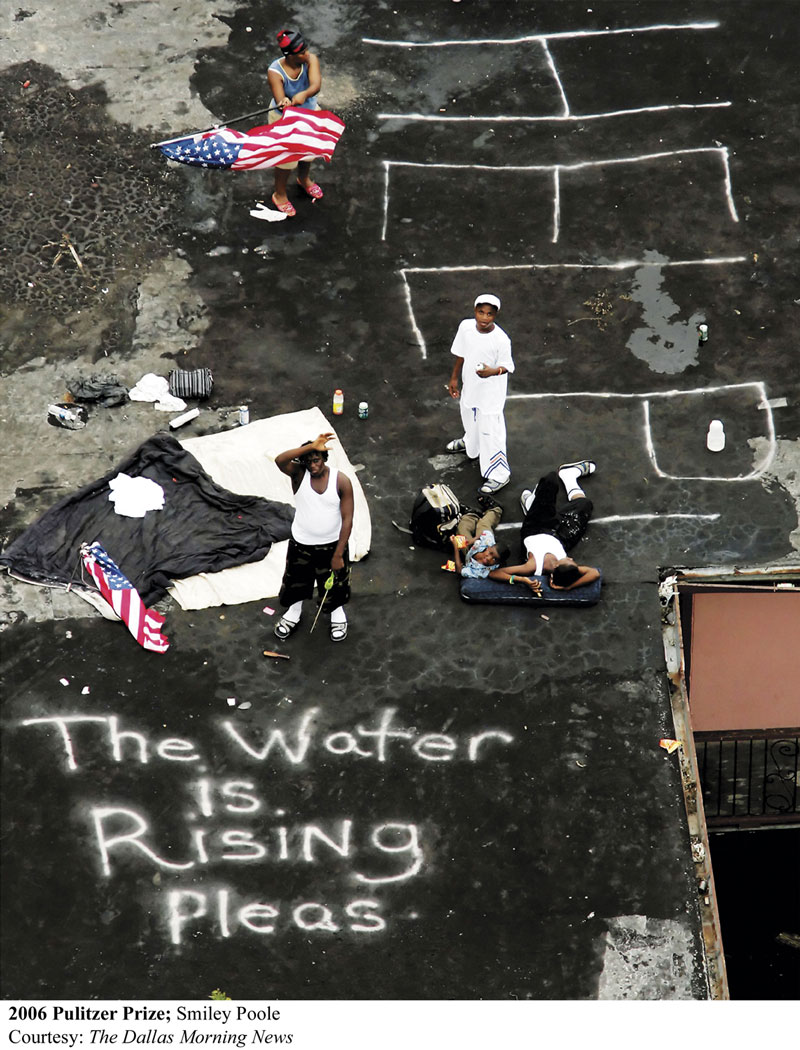History Through Pulitzer: “Hurricane Katrina”

Pulitzer Prize-winning image photographed by Smiley N. Pool of “The Dallas Morning News” on September 1, 2005. Taken in the aftermath of Hurricane Katrina, the photo shows New Orleans residents sending out a plea for help from the roof of an apartment complex.
By Diane Wanek
“Although I’m a native Nebraskan, I lived in New Orleans for many years and experienced a number of hurricanes and even some flooding while I lived there. Only once was the threat from a hurricane so dire that I left the city seeking shelter elsewhere. A voluntary or mandatory evacuation from a metropolitan area the size of New Orleans is no small feat. Tens of thousands of vehicles headed west and north in search of safety can be daunting, if not logistically impossible, and the only place I finally found a place to stay was in northeast Texas. Many people aren’t able to leave the city, and many choose to ride out the storms that occasionally assail the place, fingers crossed.
New Orleans has long been a beautiful, magical, joyous, esoteric American city with a wonderfully diverse population. It has also been indelibly marked by a stark economic/racial divide, part of its Southern American legacy that persists into the 21st Century.
This photo reminds me that divide was deepened and etched in strong relief during Hurricane Katrina. Hurricane Katrina and the breach of the levees, that were supposed to protect New Orleans, happened just after I moved back to Nebraska. I watched the slow-moving horror manifest and metastasize from my vantage in Omaha, glued to the television and my phone for days, watching in abject disbelief, at what seemed to me a failure to respond appropriately—at our federal, state and local levels—to the emergency unfolding.
I remember the images of men with guns refusing entry to safe havens in suburban Metairie across a highway overpass to low-income Black Americans fleeing the floods in their nearby New Orleans neighborhoods, I remember people waiting hopelessly for water and transportation out of the floods dying, of hospital staff screaming from their rooftops for help with at-risk patients, of neighbors trying to rescue neighbors….. it made me realize to what extent the poor and people of color are devalued in the United States, contrary to our Declaration of Independence, contrary to our Bill of Rights and Constitution. For weeks, the spray-painted markings on the houses of the Lower Ninth Ward piled up: 1 body, 2 bodies. Like some Third World country.
Feelings of anger, outrage, and helplessness overwhelmed me as I watched the television footage, day after day, and spoke with my friends – when I could reach them – in New Orleans. The areas hardest hit were great neighborhoods, full of character and characters and great places to eat, great places to hear music and hear stories. It broke my heart to know that some of my favorite haunts and people would be forever lost in Katrina’s aftermath.
Katrina and the floods that followed created massive change in New Orleans, as well as the surrounding region. While the city has been made almost whole again, it bears the scars of the experience and it’s recovery has left many residents behind. Hundreds of my friends, heart-broken, were forced to move to other parts of the country. So New Orleans has less music and a tighter, bruised and sore heart today.
Yet, there’s something about that irresistible gumbo of African, Spanish, French, Caribbean, and American culture, language, good humor, heritage, and food that will persist in New Orleans. It’s still there. But, like another great American city – Detroit – that’s been treated with less than the deference, respect, dignity, fairness and indeed celebration it deserves, New Orleans in the aftermath of Katrina feels like it will never again dance to the heart-lifting, life-infusing music, food, and joie de vivre that once defined it.”
Read more reflections on Pulitzer prize-winning photos from our local community,
Return to “History Through Pulitzer” Main Page »
VIEW CURRENT EXHIBITS
The “Pulitzer Prize Photographs” exhibition is on display at The Durham Museum from February 22 – through September 20, 2020. The exhibit features the most comprehensive collection of Pulitzer Prize-winning photographs ever assembled and was developed by the Newseum/Freedom Forum.

